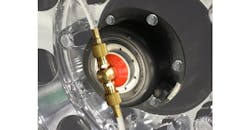PSI, SKF coordinate offerings for extended warranty coverage
Pressure Systems International (PSI) now is offering an extended warranty ranging from five to seven years on its automatic tire inflation system (ATIS) when it’s used with SKF’s Trouble-Free Operation (TFO) system.
The SKF TFO platform is designed to provide OEMs and fleets with flexibility in specifying conventional long-life wheel ends, regardless of the axle and suspension provider, PSI said.
PSI and SKF say they worked together to provide the best warranties available in the trailer market by combining their wheel-end and automatic tire inflation products. Unlike other solutions, the SKF TFO platform provides OEMs with the opportunity to source components as they do today, without requiring unique sourcing and assembly processes.
“SKF is a global leader in wheel-end technology, and we are pleased to work cooperatively with them in developing an option for fleets that demand ATIS and long-life wheel ends with compatible warranties,” said Steve Miller, PSI’s vice president of engineering.
The SKF TFO platform is available through most trailer OEMs. When the SKF TFO-7 wheel-end configuration is specified for use with the PSI ATIS, PSI automatically will extend its parts coverage to seven years.
“Fleets no longer need to feel forced into a particular wheel end solution,” said Tom Smego, director of OEM sales. “And more importantly, they know that when combining PSI and SKF, they don’t have to play referee when they need to sort out warranty concerns.”
The PSI automatic tire inflation system comes standard with the ThermALERT wheel-end, high-temperature warning system. The ThermALERT feature is a reliable and cost-effective way to warn of a pending wheel-end thermal event, PSI said. Since its introduction in 2006, it has become a standard with many fleets.
“Wheel-end thermal events are a major focus in the industry,” Miller said. “Having a burned-up wheel end will not only cost significant money from the repair standpoint, but the potential for extensive collateral damage is high.”

